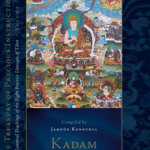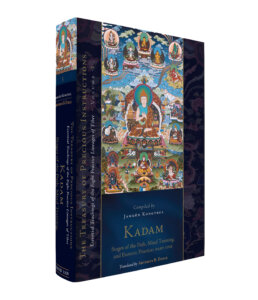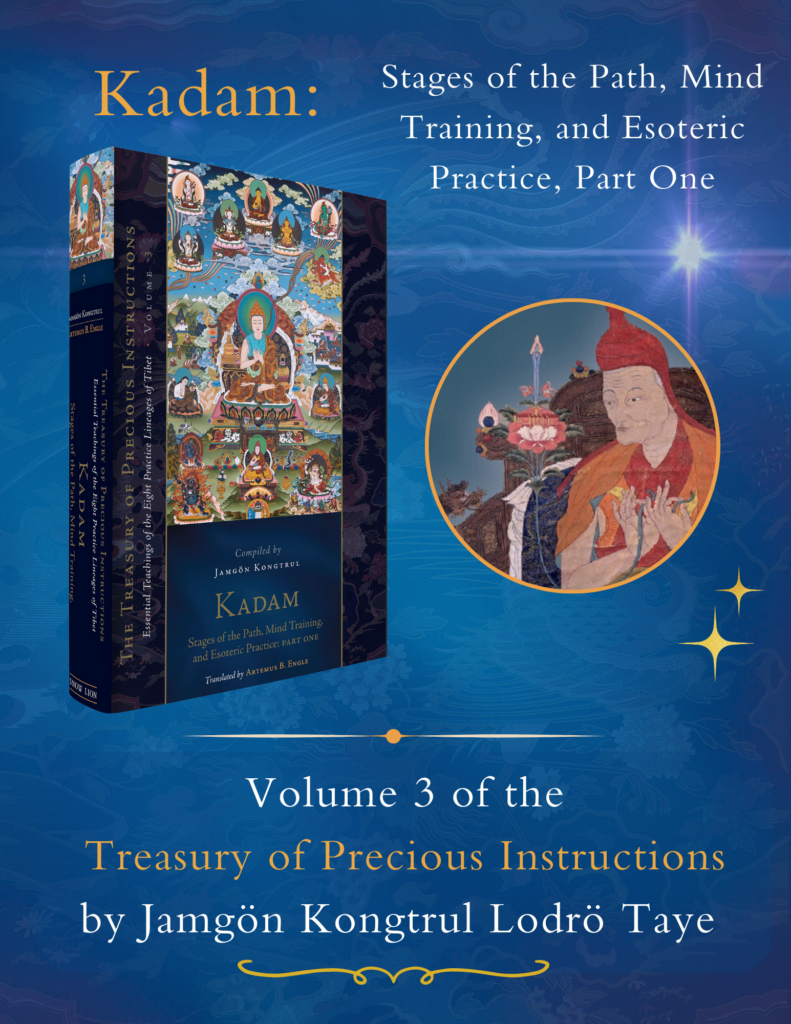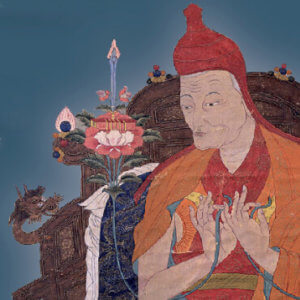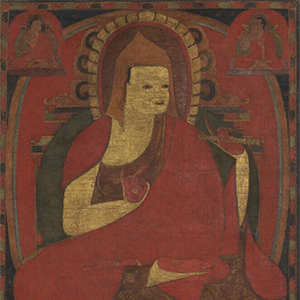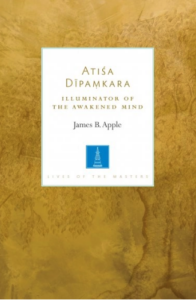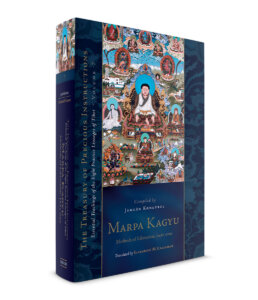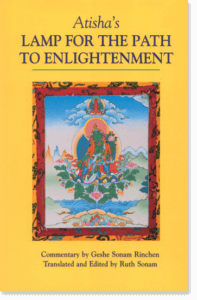Bodhisattva's Jewel Garland:
A Root Text of Mahāyāna Instruction from the Precious Kadam Scripture
Excerpted from Kadam: Stages of the Path, Mind Training, and Esoteric Practice, Part One
By Jamgon Kongtrul Lodro Taye
Translated by Artemus B. Engle
About Kadam
The third volume of this series covers the teachings and practices of the Kadam lineage. This tradition is based on the teachings of the Indian master Atiśa, who traveled to Tibet in the early eleventh century and stayed for twelve years transmitting teachings that would be embraced by many traditions of Tibetan Buddhism. The three categories of teachings covered here and in the fourth volume of the series—Stages of the Path, Mind Training, and Esoteric Instructions—correspond to three root texts: Atiśa’s Lamp for the Path to Enlightenment, the aphorisms of the Seven-Point Mind Training, and Atiśa’s Bodhisattva’s Jewel Garland. This volume also contains ritual texts on the bodhisattva vow conferral, as well as commentaries by Tsongkhapa, Tāranātha, Jamyang Khyentse Wangpo, and Jamgön Kongtrul, himself. The fourth volume of The Treasury of Precious Instructions series extends these commentaries and includes material on the esoteric instructions known as the Sixteen Drops.
About The Treasury of Precious Instructions
The Treasury of Precious Instructions by Jamgön Kongtrul Lodrö Taye, one of Tibet’s greatest Buddhist masters, is a shining jewel of Tibetan literature, presenting essential teachings from the entire spectrum of practice lineages that existed in Tibet. In its eighteen volumes, Kongtrul brings together some of the most important texts on key topics of Buddhist thought and practice as well as authoring significant new sections of his own.

Bodhisattva’s Jewel Garland
Chapter 3, page 19-23
By Atiśa
Translated by Thupten Jinpa
Sanskrit title: Bodhisattvamaṇevalī
Homage to great compassion.
Homage to the teachers.
Homage to the faith divinities.
Discard all lingering doubts,
and strive with dedication in your practice.
Thoroughly relinquish sloth, mental dullness, and laziness,
and strive always with joyful perseverance. (1)
With mindfulness, vigilance, and conscientiousness,
constantly guard the gateways of your senses.
Again and again, three times both day and night,
examine the flow of your thoughts. (2)
Reveal your own shortcomings,
but do not seek out others’ errors.
Conceal your own good qualities,
but proclaim those of others. (3)
Forsake wealth and ministrations;
at all times relinquish gain and fame.
Have modest desires, be easily satisfied,
and reciprocate kindness. (4)
Cultivate love and compassion,
and stabilize your awakening mind.
Relinquish the ten negative actions,
and always reinforce your faith. (5)
Destroy anger and conceit,
and be endowed with humility.
Relinquish wrong livelihood,
and be sustained by ethical livelihood. (6)
Forsake material possessions,
embellish yourself with the wealth of the noble ones.
Avoid all trifling distractions,
and reside in the solitude of wilderness. (7)
Abandon frivolous words;
constantly guard your speech.
When you see your teachers and preceptors,
reverently generate the wish to serve. (8)
Wise beings with dharma eyes
and beginners on the path as well—
recognize them as your spiritual teachers.
In fact when you see any sentient being,
view them as your parent, your child, or your grandchild. (9)
Renounce negative friendships,
and rely on a spiritual friend.
Dispel hostility and unpleasantness,
and venture forth to where happiness lies. (10)
Abandon attachment to all things
and abide free of desire.
Attachment fails to bring even the higher realms;
in fact, it kills the life of true liberation. (11)
When you encounter the causes of happiness,
in these always persevere.
Whichever task you take up first,
address this task primarily.
In this way, you ensure the success of both tasks,
where otherwise you accomplish neither. (12)
Since you take no pleasure in negative deeds,
when a thought of self-importance arises,
at that instant deflate your pride
and recall your teacher’s instructions. (13)
When discouraged thoughts arise,
uplift your mind
and meditate on the emptiness of both.
When objects of attraction or aversion appear,
view them as you would illusions and apparitions. (14)
When you hear unpleasant words,
view them as mere echoes.
When injuries afflict your body,
see them as the fruits of past deeds. (15)
Dwell utterly in solitude, beyond town limits.
Like the carcass of a wild animal,
hide yourself away in the forest
and live free of attachment. (16)
Always remain firm in your commitment.
When a hint of procrastination and laziness arises,
at that instant enumerate your flaws
and recall the essence of spiritual conduct. (17)
However, if you do encounter others,
speak peacefully and truthfully.
Do not grimace or frown,
but always maintain a smile. (18)
In general, when you see others,
be free of miserliness and delight in giving;
relinquish all thoughts of envy. (19)
To help soothe others’ minds,
forsake all disputation
and be endowed with forbearance. (20)
Be free of flattery and fickleness in friendship;
be steadfast and reliable at all times.
Do not disparage others,
but always abide with a respectful demeanor. (21)
When giving advice,
maintain compassion and altruism.
Never defame the teachings.
Whatever practices you admire,
with aspiration and the ten spiritual deeds,
strive diligently, dividing day and night. (22)
Whatever virtues you gather through the three times,
dedicate them toward the unexcelled great awakening.
Disperse your merit to all sentient beings,
and utter the peerless aspiration prayers
of the seven limbs at all times. (23)
If you proceed thus, you’ll swiftly perfect merit and wisdom
and eliminate the two defilements.
Since your human existence will be meaningful,
you’ll attain the unexcelled enlightenment. (24)
The wealth of faith, the wealth of morality,
the wealth of giving, the wealth of learning,
the wealth of conscience, the wealth of shame,
and the wealth of insight—these are the seven riches. (25)
These precious and excellent jewels
are the seven inexhaustible riches.
Do not speak of these to those not human.
Among others guard your speech;
when alone guard your mind. (26)
This concludes the Bodhisattva’s Jewel Garland composed by the Indian abbot Dīpaṃkara Śrījñāna.

Books Related to Kadam

